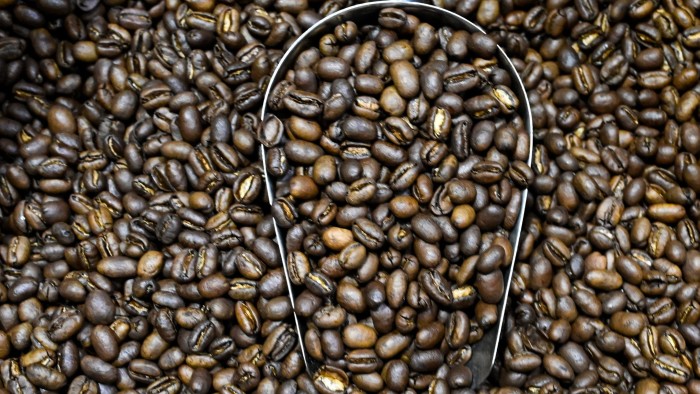Unlock the Editor’s Digest for free
Roula Khalaf, Editor of the FT, selects her favourite stories in this weekly newsletter.
Hold the joe, Joe. Donald Trump’s puzzling tariff swipe this week at Brazil was enough to make any US coffee drinker fear they’d reached for the decaf by mistake. The South American powerhouse is their biggest supplier of beans. Gulp, indeed. But Europe’s caffeine addicts should be worrying about the price of their fix too.
Coffee futures jolted higher on Thursday after the US president threatened 50 per cent tariffs on Brazilian products. In doing so, he blasted what he called a “witch-hunt” against Brazil’s former president Jair Bolsonaro, on trial over an alleged coup plot. While the Trump administration’s actions are rarely predictable, this one is particularly puzzling: the US runs a trade surplus with Brazil, not a deficit.
Market prices in New York soon eased back, though, as traders bet on the likelihood of another Taco scenario — Trump always chickens out. After all, the president and his advisers may justly fear voters getting upset if the cost of their brew leaps. Carving out specific products, or giving them lower levies, has become a common pattern over the past three months.
But this price spike — and a spiky response from current Brazilian President Luiz Inácio Lula da Silva — comes when coffee prices have only recently dropped from record levels following several poor harvests. Nestlé chief executive Laurent Freixe recently described the price rises as “unprecedented”.
It’s Europe, not the US, where drinkers have the heavier habit. The region, with 450mn people, gets through 54mn 60kg bags of coffee beans a year, according to International Coffee Organisation figures, while the 380mn living in the US and Canada consume 31mn. Cups-per-capita sums largely depend on the type of coffee drinker: fans of tiny Italian café-style espressos are rarely consumers of Starbucks’ venti buckets of filter brew.
A US-Brazil brouhaha could play havoc with prices. That might not all be bad for other countries: if the world’s largest producer and exporter finds itself with unsold beans because of the US, it is likely to seek another market. The same goes for Vietnam and Indonesia, both big producers facing hefty White House tariffs. But volatility is unhelpful, especially as executives in consumer-facing companies are likely to respond to uncertainty by trying to nudge prices higher.
Timing matters, too. Almost all of the hit from coffee price rises reaches end consumers in just eight months, according to estimates from the United Nations. That’s a lifetime to a caffeine addict, but it means current ructions could land in consumers’ laps just in time for the 2026 midterm US elections. Taco with your cappuccino?
